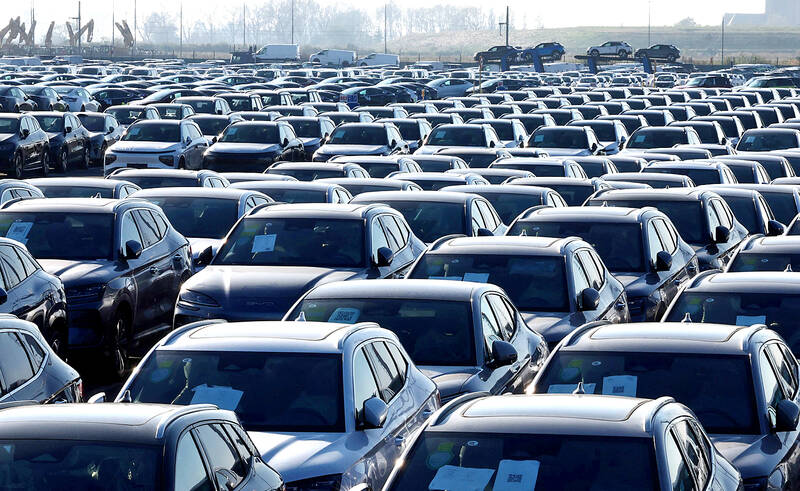The EU has imposed duties on imports of electric vehicles (EVs) from China starting yesterday after talks between Brussels and Beijing failed to find an amicable solution to their trade dispute.
EVs have become a major flashpoint in a broader trade dispute over the influence of Chinese government subsidies on European markets and Beijing’s burgeoning exports of green technology to the bloc.
“By adopting these proportionate and targeted measures after a rigorous investigation, we’re standing up for fair market practices and for the European industrial base,” European Commission Executive Vice President Valdis Dombrovskis said on Tuesday.

Photo: Reuters
“In parallel, we remain open to a possible alternative solution that would be effective in addressing the problems identified and WTO-compatible,” he added.
The duties would stay in force for five years, unless an amicable solution is found.
According to the commission, which manages trade disputes on behalf of the 27 EU member countries, sales of Chinese-built electric cars jumped from 3.9 percent of the EV market in 2020 to 25 percent by September last year, in part by unfairly undercutting EU industry prices.
The duties on Chinese manufacturers would be 17 percent on cars made by BYD Co (比亞迪), 18.8 percent on those from Geely Holding Group Co (吉利控股集團) and 35.3 percent for vehicles exported by China’s state-owned SAIC Motor Corp (上海汽車). Geely has brands including Polestar and Sweden’s Volvo, while SAIC owns Britain’s MG, one of Europe’s best-selling EV brands.
Other EV manufacturers in China, including Western companies such as Volkswagen AG and BMW AG, would be subject to duties of 20.7 percent. The commission has an “individually calculated” rate for Tesla Inc of 7.8 percent.
The Chinese Ministry of Commerce objected to the measures as protectionist and unfair.
“China does not agree with it and will not accept the ruling,” the ministry’s statement said. “China will continue to take all necessary measures to resolutely safeguard the legitimate rights and interests of Chinese companies.”
The EU’s retaliatory duties have run into opposition in Germany, which has Europe’s biggest economy and is home to major automakers.
Hildegard Muller, president of Germany’s auto industry association VDA said the imposition of the tariffs is “a setback for free global trade and so for prosperity, the preservation of jobs and Europe’s growth.”
The move increases the risk of a far-reaching trade conflict, Muller said in a statement.
“The industry is not naive in dealing with China, but the challenges must be resolved in dialogue,” Muller added.
The rapid growth in China’s market share has sparked concern in the EU that Chinese cars would eventually threaten the EU’s ability to produce its own green technology to combat climate change. Business groups and unions also fear that the jobs of 2.5 million auto industry workers could be put in jeopardy, as well as those of 10.3 million more people whose employment depends indirectly on EV production.

Intel Corp chief executive officer Lip-Bu Tan (陳立武) is expected to meet with Taiwanese suppliers next month in conjunction with the opening of the Computex Taipei trade show, supply chain sources said on Monday. The visit, the first for Tan to Taiwan since assuming his new post last month, would be aimed at enhancing Intel’s ties with suppliers in Taiwan as he attempts to help turn around the struggling US chipmaker, the sources said. Tan is to hold a banquet to celebrate Intel’s 40-year presence in Taiwan before Computex opens on May 20 and invite dozens of Taiwanese suppliers to exchange views

Application-specific integrated circuit designer Faraday Technology Corp (智原) yesterday said that although revenue this quarter would decline 30 percent from last quarter, it retained its full-year forecast of revenue growth of 100 percent. The company attributed the quarterly drop to a slowdown in customers’ production of chips using Faraday’s advanced packaging technology. The company is still confident about its revenue growth this year, given its strong “design-win” — or the projects it won to help customers design their chips, Faraday president Steve Wang (王國雍) told an online earnings conference. “The design-win this year is better than we expected. We believe we will win

Chizuko Kimura has become the first female sushi chef in the world to win a Michelin star, fulfilling a promise she made to her dying husband to continue his legacy. The 54-year-old Japanese chef regained the Michelin star her late husband, Shunei Kimura, won three years ago for their Sushi Shunei restaurant in Paris. For Shunei Kimura, the star was a dream come true. However, the joy was short-lived. He died from cancer just three months later in June 2022. He was 65. The following year, the restaurant in the heart of Montmartre lost its star rating. Chizuko Kimura insisted that the new star is still down

While China’s leaders use their economic and political might to fight US President Donald Trump’s trade war “to the end,” its army of social media soldiers are embarking on a more humorous campaign online. Trump’s tariff blitz has seen Washington and Beijing impose eye-watering duties on imports from the other, fanning a standoff between the economic superpowers that has sparked global recession fears and sent markets into a tailspin. Trump says his policy is a response to years of being “ripped off” by other countries and aims to bring manufacturing to the US, forcing companies to employ US workers. However, China’s online warriors